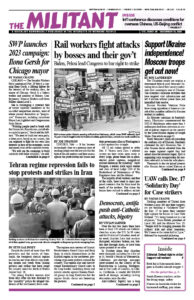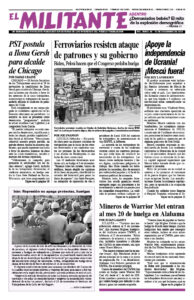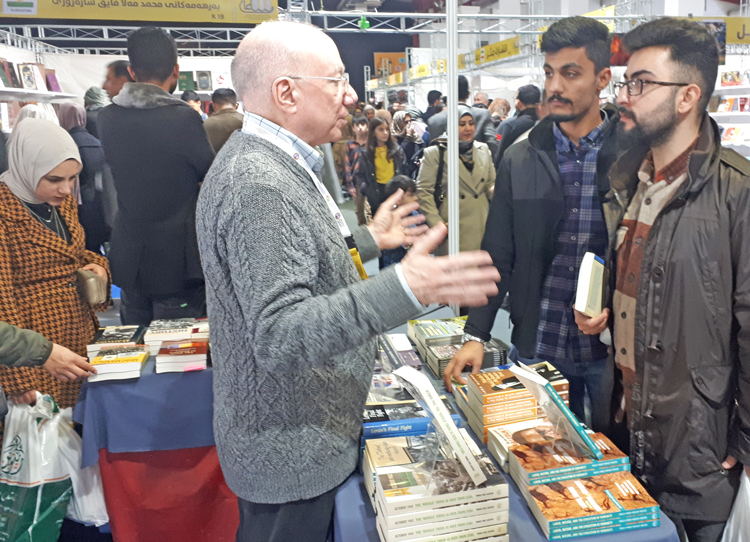SULAYMANIYAH, Kurdistan Region, Iraq — The 10-day Sulaymaniyah International Book Fair ended Nov. 26, drawing tens of thousands of people eager to get their hands on books in Kurdish, English and Arabic. Busloads of students and schoolchildren walked up and down aisles, as did workers, teachers, families, and groups of friends.
The fourth annual book fair here registered advances in the Kurdish national struggle for self-determination. Some 30 million Kurds in Iraq, Iran, Syria and Turkey make up the world’s largest nation without their own country. Amid social, economic and political disorder resulting from decades of tyrannical bourgeois rule and U.S.-led military assaults, Kurds have established an autonomous region and government in northeast Iraq.
According to book fair organizers, over half the 200 publishers with booths were Kurdish. Others came from elsewhere in Iraq, other majority-Arab countries, as well as Iran and Turkey. A large stand featured publishers from the Kurdish region of Iran, including books on its history of struggle. Another had books in Arabic and Kurdish from northeast Syria. A third promoted the legacy of Yilmaz Guney, a Kurdish writer and filmmaker from Turkey.
“Year after year Kurdish publishing is increasing,” Simko Mohammad, a member of the fair’s organizing committee, told the Militant. “This is a cultural advance. There are more writers.”
“We want the public, too,” Mohammad said, “We want to bring Kurds together from everywhere. But we face barriers of geography and security.”
This effort takes place as Kurds in Iran carry out protests and strikes against the bourgeois-clerical government in Tehran. These actions combine the Kurdish people’s fight for national self-determination and the struggle of working people of all nationalities against that repressive regime.
In recent weeks, both the Iranian and Turkish governments have stepped up military attacks on Kurds. Tehran has launched deadly attacks on protesters in Iran, and missile assaults on Kurdish-Iranian organizations based in Iraqi Kurdistan. Ankara has bombed Kurdish towns in both Iraq and Syria. Baghdad and the Kurdish Regional Government in Erbil have protested these violations of Iraq’s sovereignty, at the same time promising these two regional bullies to clamp down on exile groups.
These events, central to world politics, were on the minds of those who talked with volunteers at the Pathfinder Books stand, which featured books by communists and other working-class leaders. This was the fourth time the London distributor of books from New York-based Pathfinder Press participated in a book fair in the Kurdistan region.
What’s happening in Iran is not just a women’s movement, said university student Nwa Abdullah, “but also a Kurdish movement and a movement for freedom all over Iran.”
The struggles of Kurds in Iraq and Iran have been intertwined across history. Many have family or other links on both sides of the border imposed by these capitalist states, a mere 70-mile drive from Sulaymaniyah. A worker at a print shop turned out to be from Saqqez, the hometown of Jina Amini. She showed us videos on her phone of ongoing protests.
A book fair participant got a first-hand report from the Ekbatan area of Tehran Nov. 20, after a brutal government crackdown in Mahabad and other Kurdish cities. People were chanting “Mahabad, Kurdistan, setting example for Iran” into the night. Other fairgoers smiled and said they had heard this was being chanted elsewhere in Iran, too.
A long view of history
Many were interested in Pathfinder books to get a historic perspective on these events. The top seller was Labor, Nature, and the Evolution of Humanity (97 copies) by Karl Marx, Frederick Engels, and U.S. Socialist Workers Party leaders George Novack and Mary-Alice Waters. “Without understanding how human society, since our remotest ancestors, has been created through social labor,” Waters explains, “working people remain prisoners of the capitalist epoch in which we live.”
Some people knew Pathfinder from three book fairs it attended in Erbil in 2017-19 and from the Haval Bookstore there, which displays Pathfinder titles. Young people often brought others to the stand. Among them was Shadan Ahmed, a newly graduated lawyer.
“U.S. attacks on Iraq were terrible,” Ahmed said, referring to the 1990-91 Gulf War and 2003 U.S.-led invasion. “As a Kurd, I also know that amid those conditions we fought to win freedom. Of course, it’s not real freedom, because we still have capitalism.” She picked up a copy of New International magazine featuring the article “Washington’s Assault on Iraq: Opening Guns of World War III” by SWP National Secretary Jack Barnes.
“Will there be a revolution?” Ahmed asked. She was glad to hear that the same book discusses leadership lessons from the 1979 revolution that overthrew the shah in Iran and the subsequent bourgeois counterrevolution. It reviews the record of a communist party that functioned in Iran from 1979 to 1982, fighting for a working-class course, including its backing for struggles by Kurds and other oppressed nationalities.
Questions of class politics
“I need your books about capitalism,” student Meer Hammza said as he bought Are They Rich Because They’re Smart? by Barnes and The Communist Manifesto by Marx and Engels. “Here they promote capitalist ideas,” he said, “but I don’t think it’s the right way.” Both titles sold out. Recognition of the brutal realities of capitalism was evident, including growing class divisions and worsening conditions for working people in the Kurdistan region itself.
This was reflected in sales of six copies of The Turn to Industry: Forging a Proletarian Party by Barnes. A socialist revolution in the U.S., the SWP leader says, is “inconceivable without organizing our class to fight to build unions and to use union power to advance the interests of working people here and around the world.” And forging a proletarian party to change which class exercises state power “is impossible without participating in that struggle.”
Titles on the roots of women’s oppression and the fight for liberation were in such high demand that most also sold out. These included Cosmetics, Fashions, and the Exploitation of Women (23 sold) by SWP leaders Joseph Hansen, Evelyn Reed and Waters; Women and the Family (six) by Russian revolutionary leader Leon Trotsky; and Problems of Women’s Liberation (17) and Sexism and Science (nine), both by Reed. The last two titles, as well as Are They Rich Because They’re Smart? were on sale for the first time in Arabic. Beirut-based Nousous Publications, which translated and published them, says they’ve been well received in Lebanon.
Also popular was The Jewish Question (36) by Abram Leon. Many bought it after learning Pathfinder had issued a new edition, with a 2020 introduction by SWP leader Dave Prince, in response to a renewed worldwide spread of anti-Semitic venom and violent assault on Jews.
Simko Mohammad told the Militant that book fair organizers aim to keep improving. “Next year I hope there will be even more variety and acceptance of different ideas.”
“The Kurdish people have sacrificed a lot,” he said. “There have been many killings. But we aspire for more advancement for our people. We don’t make excuses. We compare our cultural level with people all over the world.”


